Copyright 2009 by Harold Urschel
Cover and internal design 2009 by Sourcebooks, Inc.
Cover design by Cyanotype Book Architects
Cover photo iStockPhoto.com/MiguelAngeloSilva
Internal photos The Urschel Recovery Science Institute
Sourcebooks and the colophon are registered trademarks of Sourcebooks, Inc.
All rights reserved. No part of this book may be reproduced in any form or by any electronic or mechanical means including information storage and retrieval systemsexcept in the case of brief quotations embodied in critical articles or reviewswithout permission in writing from its publisher, Sourcebooks, Inc.
All brand names and product names used in this book are trademarks, registered trademarks, or trade names of their respective holders. Sourcebooks, Inc., is not associated with any product or vendor in this book.
This book is not intended as a substitute for medical advice from a qualified physician. The intent of this book is to provide accurate general information in regard to the subject matter covered. If medical advice or other expert help is needed, the services of an appropriate medical professional should be sought.
Published by Sourcebooks, Inc.
P.O. Box 4410, Naperville, Illinois 60567-4410
(630) 961-3900
Fax: (630) 961-2168
www.sourcebooks.com
Library of Congress Cataloging-in-Publication Data
Urschel, Harold.
Healing the addicted brain : the revolutionary, science-based alcoholism and addiction recovery program / Harold Urschel.
p. cm.
Includes index.
1. AlcoholismTreatment. 2. Substance abuseTreatment. 3. BrainEffect of drugs on. I. Title.
RC565.U77 2009
616.86'06dc22
2008045016
To my wife, Christi, and two sons, Chance and Carr, for encouraging me to write a book that would really make a difference.
CONTENTS
Introduction
Addiction is a lifelong disease, and to many who are caught in its web, it can seem like finding the right treatment takes just about as long.
If youre struggling with addiction, theres a good chance youve already seen several physicians and psychologists, have been through an inpatient or outpatient (at home) treatment program, and have had exhaustive rounds of talking therapy, which you were told was the state-of-the-art approach to curing addiction. Despite all this treatment, you are still addicted. Your work performance is suffering and family relations fraying; you either have screaming fights with your spouse/significant other or have retreated into a sullen, secretive silence. Youre still spending much too much money on your habit, and your children are still at risk of physical and emotional damage.
If youre a member of an addicts family, or perhaps a close sober friend, you feel as if youve heard too many failed promises to sober up, covered up too much bad behavior, watched the family be pulled apart and the finances drained, and stood by helplessly as dreams were shattered and the life of the addict slowly slipped away. Youve been through the emotional wringer too many times and seen the latest guaranteed treatment fail repeatedly. Sometimes you wish you could just walk away from it allbut you know you cant and feel absolutely stuck.
Through it all, whether youre the addict or the family member, youve wondered if there is any point to treatment. Why have your hopes been dashed over and over again? Why not just accept the obvious fact that an addict is an addict, and addiction is ultimately untreatable?
Before they came to me for help, many of my patients and their families feel that way, with good reason. Traditionally, the success rate for addiction treatment was abysmally low. A few of the medicines we had available were effective, but their use was limited or restricted for various reasons. The treatment most health experts pinned their hopes on, talking therapy, was not very successful. As a result, most addicts, their families, and friends were repeatedly disappointed. Understandably, many simply gave up.
Im here to tell you that you no longer have to feel helpless and hopeless. There is hope, new hope that stems from a new scientific understanding of the nature of addiction plus novel medicines that finally allow us to control cravings and fix the physical damage to the brain caused by addiction. We now know that addiction is a chronic brain disease, that brain damage interferes with the addicts ability to respond to talking therapy, and that once the physical brain damage has been repaired, talking therapy and other elements of traditional treatment can be very successful.
Were at the beginning of a new era in addiction medicine, armed with a fresh view of the disease plus high-tech medicines and other treatments that will allow success for up to 90 percent of those who seek help. This is not just a tremendous improvement in the treatment rate; it represents a paradigm shift that will help us to turn the understanding of addiction from a shameful habit that destroys lives into a treatable illness.
I know you may have been disappointed before, but I can tell you that there is good reason for hope. The ideas and treatment concepts described in this book can help you regain your life or that of your loved one.
This book offers a comprehensive look at the new understanding of addiction and its treatment. Reading through it will arm you with the latest treatment information and ideas to help you to get the most from your recovery programor help a loved one through treatment. However, space limitations prevented me from providing the many checklists, inventories, worksheets, and even some ideas that I normally make available to my patients. If you would like to see these documents, and learn even more about the latest addiction treatments, look for this symbol throughout the text:  . This indicates that there are checklists, inventories, or worksheets, or perhaps additional information, to be found at www.EnterHealth.com/HealingtheAddictedBrain, a state-of-the-art website I developed to provide education and support for alcoholics, addicts, and their families.
. This indicates that there are checklists, inventories, or worksheets, or perhaps additional information, to be found at www.EnterHealth.com/HealingtheAddictedBrain, a state-of-the-art website I developed to provide education and support for alcoholics, addicts, and their families.
The secret sauce in this book is science. Through this book, the EnterHealth.com website, the Urschel Recovery Science Institute, and my lectures, I continually strive to introduce the latest scientific research findings into everyday clinical practice. The National Institutes of Health spend hundreds of millions of dollars a year looking for new methods and medications to treat addiction. Unfortunately, the findings from this research rarely make their way into clinical addiction treatment programs. My goal is to change that, immediately and forever. The latest and best research findings on heart disease, diabetes, and other chronic diseases are regularly and rapidly translated into improved clinical practice; its time for that to happen in addiction treatment as well.
Its because of my emphasis on the science of addiction treatment that I call my concepts Recovery Science. As I take you through each of the major topics you need to understand and apply to your own or a loved ones recovery program, I will interject the latest scientific research into my discussions.
I want to finish this introduction with an important warning. Although you will get the latest information on understanding and treating addiction in this book, it is specifically designed to be used in concert with a real-life treatment program, or the education and support that you will find on www.EnterHealth.com/HealingtheAddictedBrain. You can no more cure addiction with this book alone than you can treat diabetes successfully just by reading a book on that disease. Medicine is a science, but it is also an art that requires applying a variety of important rules to different people with different individual needs. You will learn the overarching treatment concepts and topics in this book, but each person is unique and must be guided by a healthcare provider, therapist/coach, and sponsor who can create a successful addiction recovery program. Learn from this book, share it with your family, sponsor, and healthcare provider, but allow them to help you beat this life-threatening illness. If you do this, your chances of recovery approach 90 percentan amazing number for any chronic illness.

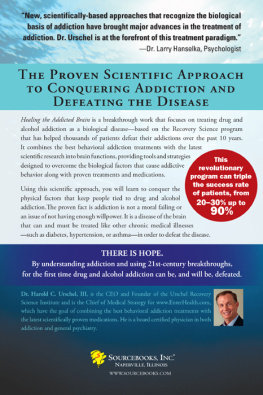
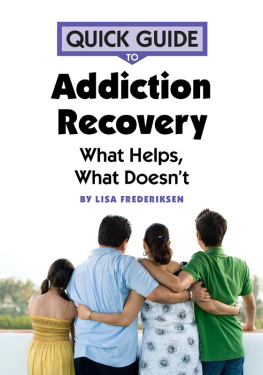

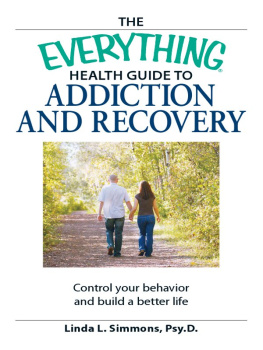
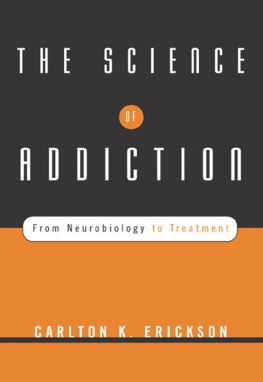
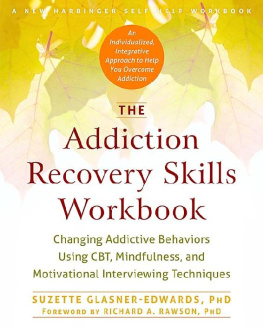
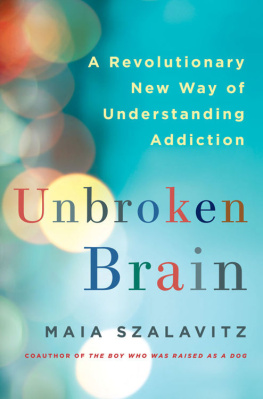
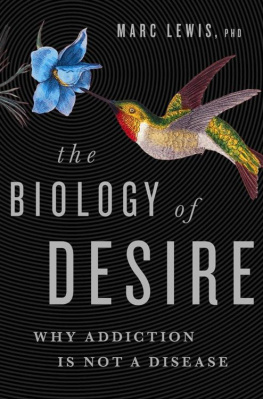
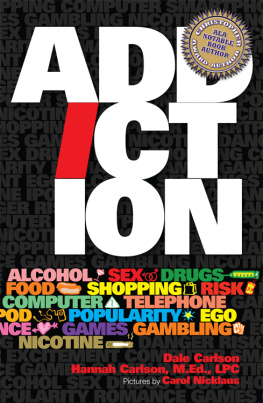
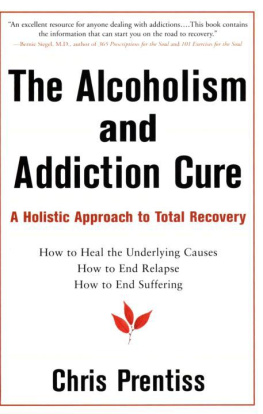


 . This indicates that there are checklists, inventories, or worksheets, or perhaps additional information, to be found at www.EnterHealth.com/HealingtheAddictedBrain, a state-of-the-art website I developed to provide education and support for alcoholics, addicts, and their families.
. This indicates that there are checklists, inventories, or worksheets, or perhaps additional information, to be found at www.EnterHealth.com/HealingtheAddictedBrain, a state-of-the-art website I developed to provide education and support for alcoholics, addicts, and their families.